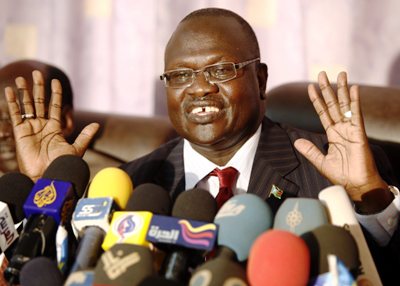Ex-VP Machar says forces will divert oil revenues from Juba
December 23, 2013 (LONDON) – South Sudan’s former vice-president, Riek Machar, says forces under his command will divert oil revenues accrued from the country’s oil wells, days after his troops seized control of much of the new nation’s oilfields.

He said no money would go to the government in Juba, explaining that his group plans to divert oil revenues and deal directly with Sudan in implementing the September 2012 cooperation agreements, as they are in control of the concerned states.
“We will establish an extra account to which the oil revenues will be remitted for the economic interest of the people of South Sudan”, said Machar, adding that Juba will be isolated until his group takes over power from president Salva Kiir.
On 15 December, serious clashes erupted in the capital, Juba, after “misunderstandings” between the presidential guards, mainly from the Dinka and Nuer ethnic groups.
Kiir accused Machar and his supporters of orchestrating a coup attempt, accusations his former deputy denies, saying the president was simply using the incident as a ploy to get rid of his political opponents.
Rival factions within South Sudan’s army (SPLA) have been fighting since Sunday, with the conflict increasingly divided along tribal lines.
While Machar has left the capital, Juba, his forces have made significant gains in the past six days, and are now in control of Jonglei and oil-rich Unity state.
The government has vowed to retake Jonglei capital Bor, the capital of Jonglei, although Machar claims a sizeable force of government troops was defeated between Juba and Mangala, forcing a retreat back to the capital.
KIIR ADMITS LOSSES
While addressing the country’s national legislative assembly, the president conceded his government had lost control over two of the country’s 10 states.
“Machar now has control over Jonglei state and he has control over Unity state. These are the two states that he has control over. How many states do we have? We have 10 states. And if you control two states you will still be the minority”, Kiir told lawmakers on Monday.
He advised people not to listen to what he described as “rumours” being circulated by forces loyal to Machar.
“They are advising people to flee and run away from Juba. I will tell the people don’t listen to these rumours”, Kiir said.
Machar claimed on Monday that his forces had captured most parts of Upper Nile state; another oil-rich state north of the country, as more army divisions reportedly pledged their loyalty to him.
“Division seven under Major General Lual Chol has today (Monday) declared its loyalty”, Machar told Sudan Tribune, as fighting erupted early Monday morning between anti-government forces and those loyal to president Kiir, across most Upper Nile counties.
Meanwhile, further violence is expected in some remaining areas still under government control, including the capital, Malakal.
MACHAR DISMISSES “PROPAGANDA”
However, Machar said the whole of Upper Nile will “soon” fall under his control, dismissing what he described as government “propaganda” on the radio, which he said “misleads” citizens that the president remains in control.
He said his forces will protect oil companies and workers in the two oil-producing states of Upper Nile and Unity.
Machar has also criticised Kiir’s government for allegedly backing the shutdown of oil companies, after rebels took control of the oil fields, saying the move would affect people’s livelihoods.
Machar called on oil companies in the area to continue their operations under the protection of his forces.
Analysts, however, say the capture of the oil-producing states is a major blow to the Juba government, which depends on oil revenues for 98% of its budget revenues.
(ST)
Read all Sudan Tribune‘s coverage of the crisis in South Sudan here:
The latest tweets on the crisis in South Sudan:
